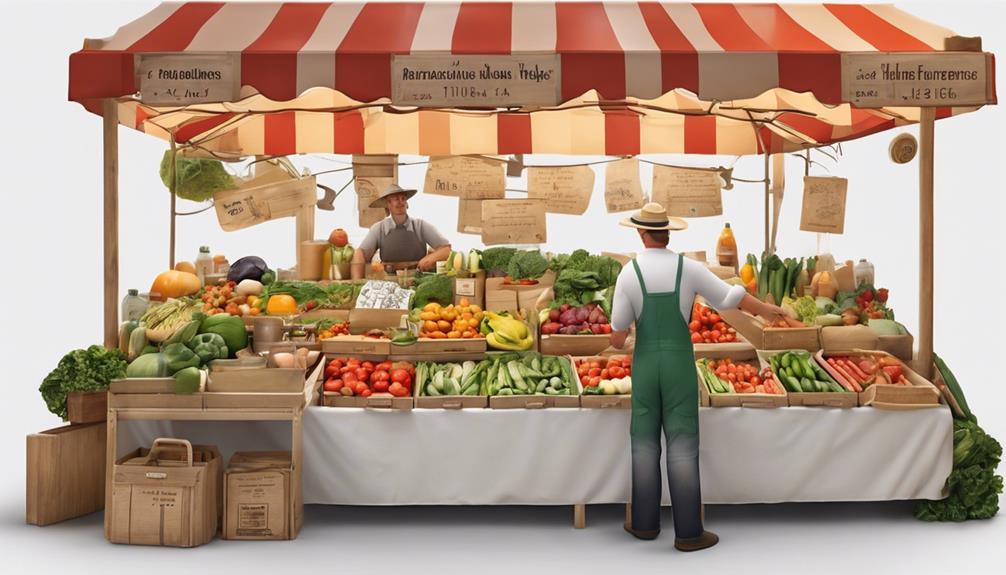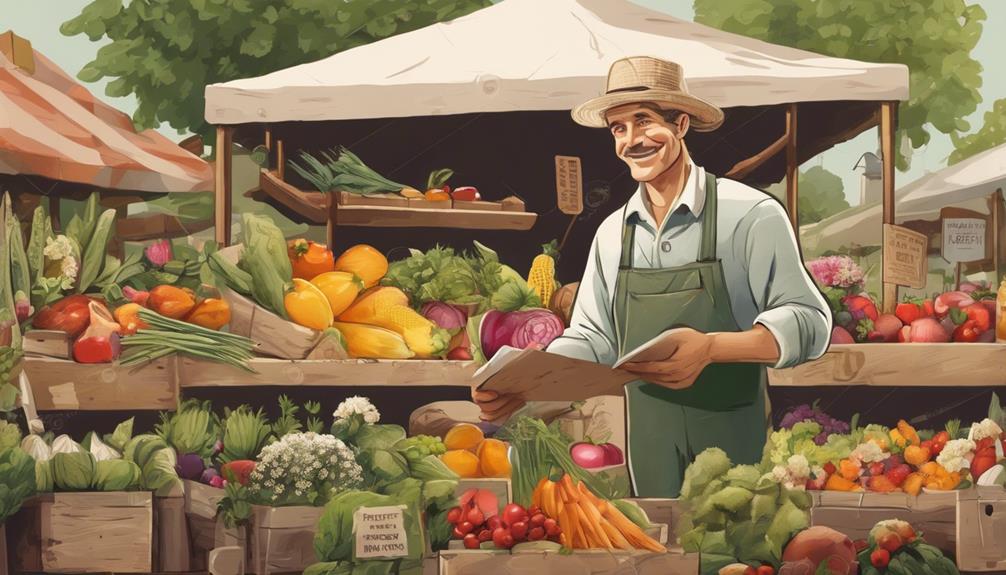To operate a farmers market in Texas, you must obtain a business license from the Texas Department of Agriculture and a permit from the Texas Department of State Health Services. Expect yearly inspections, with initial fees starting at $32.16 and renewals ranging from $192.98 to $321.64. The Houston Health Department handles city licenses, requiring annual renewal. County health department permits are also necessary, with costs under $100 per year. It is crucial to follow regulations, get liability insurance, and acquire an operator’s license. Stall fees may vary, so it is wise to budget for upfront and additional expenses to stay within your budget and increase profits. For more detailed information, refer beyond this brief overview.
Key Takeaways
- Obtain business license from Texas Department of Agriculture.
- Secure permit from Texas Department of State Health Services.
- Renew license annually with required fees.
- Comply with city and county health department regulations.
- Acquire insurance for liability coverage and credibility.
Licensing Requirements for Farmers Market Vendors
When obtaining a business license for farmers markets, vendors in Texas must adhere to specific licensing requirements. To operate legally, farmers market vendors need a license from the Texas Department of Agriculture. This license signifies that vendors are part of a certified farmers market recognized by the state, ensuring compliance with regulations and standards set forth by the department.
Additionally, vendors must obtain a permit from the Texas Department of State Health Services and have it on-site during market operations. This permit is important for demonstrating adherence to food safety protocols and regulations.
Furthermore, vendors are subject to annual inspections post-approval to verify ongoing compliance with health and safety standards. The licensing process includes an initial fee of $32.16 and an annual renewal fee of $192.98 for 1-9 vendors or $321.64 for 10+ vendors. Renewal invoices are typically sent 30-45 days before expiration, providing vendors with ample time to renew online, in person, or by mail. Payment is required to generate a new license for the upcoming year, ensuring continuous legal operation at farmers markets.
City Business License Application Process

To proceed with the necessary steps for obtaining a city business license for farmers markets in Houston, vendors must engage with the Houston Health Department. The application process involves submitting the required documents and paying the license fee.
It's important to note that these licenses are valid for one year and must be renewed annually to continue operating at the farmers market. Renewal invoices are typically sent out 30-45 days before the expiration date of the current license. Vendors should make sure that any outstanding balances are cleared to facilitate the renewal process and receive a new license promptly.
The Houston Health Department oversees the licensing process and manages the annual renewal procedures. By following these guidelines and promptly addressing any renewal requirements, vendors can guarantee they maintain compliance with the city business license regulations for farmers markets in Houston.
County Health Department Permitting Procedures

Understanding the County Health Department permitting procedures is crucial for vendors looking to operate at farmers markets in Texas. County health department permits are a necessity for selling products at these markets. Vendors must contact the Health Department prior to selling their goods and obtain the necessary permits. These permits are valid for a minimum of one year, as mandated by the Texas Health and Safety Code §437.0065(c), and come with an annual fee that doesn't exceed $100.
It's important to note that inspection is required, and vendors can schedule this by calling 832.393.5100 after receiving their permit.
For permit renewal, vendors should expect to receive a renewal invoice 30-45 days before the expiration date. To guarantee a smooth renewal process, any due balance must be settled before the renewal invoice is mailed out. By following these procedures set by the County health department, vendors can continue to operate at farmers markets and provide their products to customers seamlessly.
Insurance and Operators License Necessities

Securing proper insurance coverage and obtaining the necessary operator's license are essential steps for vendors participating in farmers markets. When venturing into the world of farmers markets, it is vital to understand the importance of protecting your business and complying with regulations. The table below outlines key points regarding insurance and operator's license necessities:
| Insurance | Operators License |
|---|---|
| – General liability | – Professionalism |
| – Product liability | – Compliance with rules |
| – Commercial property | – Enhanced credibility |
Ensuring that your insurance coverage includes general and product liability, as well as possibly commercial property insurance, will safeguard your business against unforeseen circumstances. Acquiring an operator's license showcases your commitment to following regulations, boosting your reputation with customers and market organizers. It is imperative to research and adhere to the insurance requirements set by farmers markets to prevent any disruptions to your operations and to maintain legal compliance.
Stall Costs and Payment Details

Understanding the financial aspects of farmers markets involves evaluating stall costs and grasping the various payment details associated with securing a spot in these bustling marketplaces. Stall costs can vary from a few hundred dollars per season to several hundred dollars per week, depending on the market's location and popularity.
When considering participation, vendors should budget for upfront fees for stall rental, which may include additional charges for amenities or services provided. Some farmers markets offer vendor incentives such as seasonal discounts for those opting for long-term stall rentals, helping vendors save costs.
To secure a spot at high-demand markets, vendors may be required to pay a deposit or reservation fee in advance. It's important for vendors to carefully consider these stall costs and payment details when planning their participation in farmers markets to make sure they align with their budget and maximize their earnings potential.
Compliance With Market Regulations

Adherence to market regulations is paramount when applying for a business license for a farmers market in Texas. To guarantee compliance, understanding the Texas Administrative Code Title 25, Chapter 229.701-704 is essential. Additionally, Senate Bill 617 introduced significant changes to the Texas Health and Safety Code, impacting farmers market regulations. Compliance includes meeting food safety standards, undergoing vendor training, and fulfilling permit requirements. Understanding the definitions and eligibility criteria set by the market is vital to meet regulatory standards. Below is a table summarizing key aspects of compliance with market regulations:
| Aspect | Importance | Examples |
|---|---|---|
| Food Safety | Crucial for public health and consumer trust | Proper storage, handling, and labeling |
| Vendor Training | Ensures understanding of regulations and best practices | Courses on sanitation and quality control |
| Permit Requirements | Legal obligations that must be met for market operation | Health permits, vendor licenses |
| Definitions | Clarity on terms used in regulations | Types of products, market categories |
Ensuring compliance with these regulations is fundamental in obtaining and maintaining a business license for a farmers market in Texas.
Frequently Asked Questions
Do You Need a License to Sell at a Local Farmers Market?
Yes, a license is necessary to sell at a local farmers market. This permit guarantees compliance with health and safety regulations, allowing vendors to operate at designated market locations. It's vital to have the permit on-site during market hours to demonstrate adherence to standards.
In Texas, a Farmers Market Permit is required for legal selling, with annual renewal fees based on the number of vendors. This commitment to consumer safety is pivotal for successful market participation.
Do You Need a License to Sell Food at a Farmers Market in Texas?
Yes, you need a license to sell food at a farmers market in Texas. The license fee is $128.66, with an additional admin fee of $32.16.
It's important to have a valid permit on-site during market hours to operate legally. Vendors must meet the Texas Department of State Health Services license requirements and undergo annual inspections to make sure food safety standards are maintained.
What Permits Do I Need to Sell at a Farmers Market California?
When selling at California farmers markets, permits are essential for compliance. Different counties have varying requirements for vendors. Health Code adherence is a must to guarantee consumer safety.
Cottage Food Operations are popular for new vendors. Understanding sales tax laws is critical. Permits often entail regulations on food handling, preparation, and storage.
It's important to be informed and prepared to navigate the intricacies of selling at these markets successfully.
What Do I Need to Sell at a Farmers Market in Florida?
To sell at a Florida farmers market, you'll need to comply with state laws, including regulations on sales tax, health codes, and perhaps county-specific permits.
Ensuring adherence is vital for all vendors. Starting with a clear understanding of these requirements can help you navigate the process smoothly.
Conclusion
In summary, obtaining a business license for a farmers market requires careful attention to detail and compliance with various regulations. Just like tending to a flourishing garden, managing the licensing process can be a rewarding experience with the right preparation and knowledge.
By following the steps outlined in this article, vendors can cultivate a successful business at the market and reap the benefits of sharing their produce with the community.









